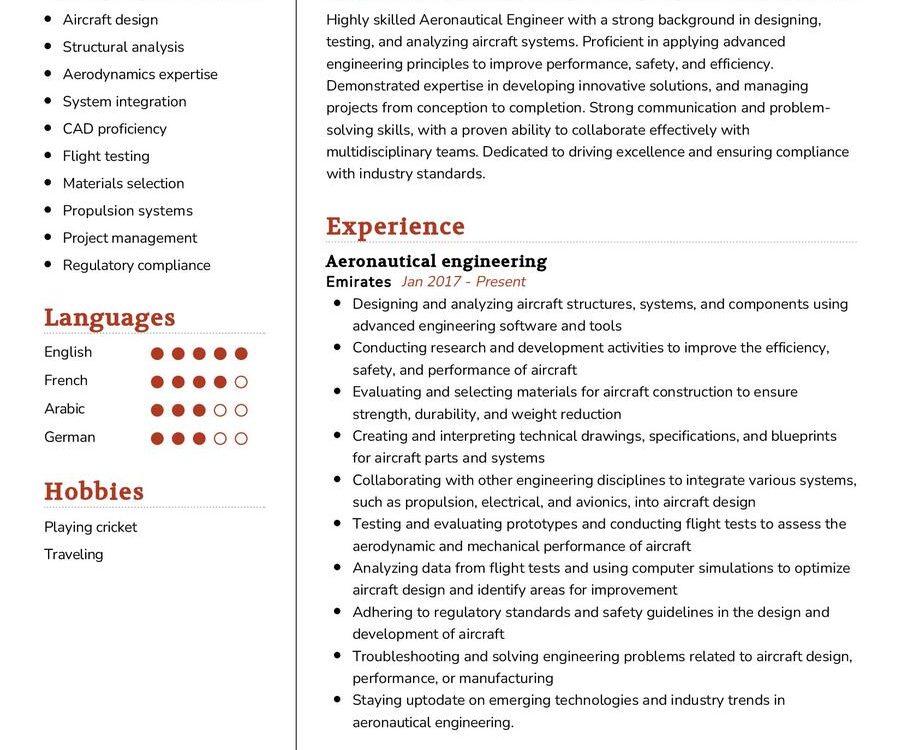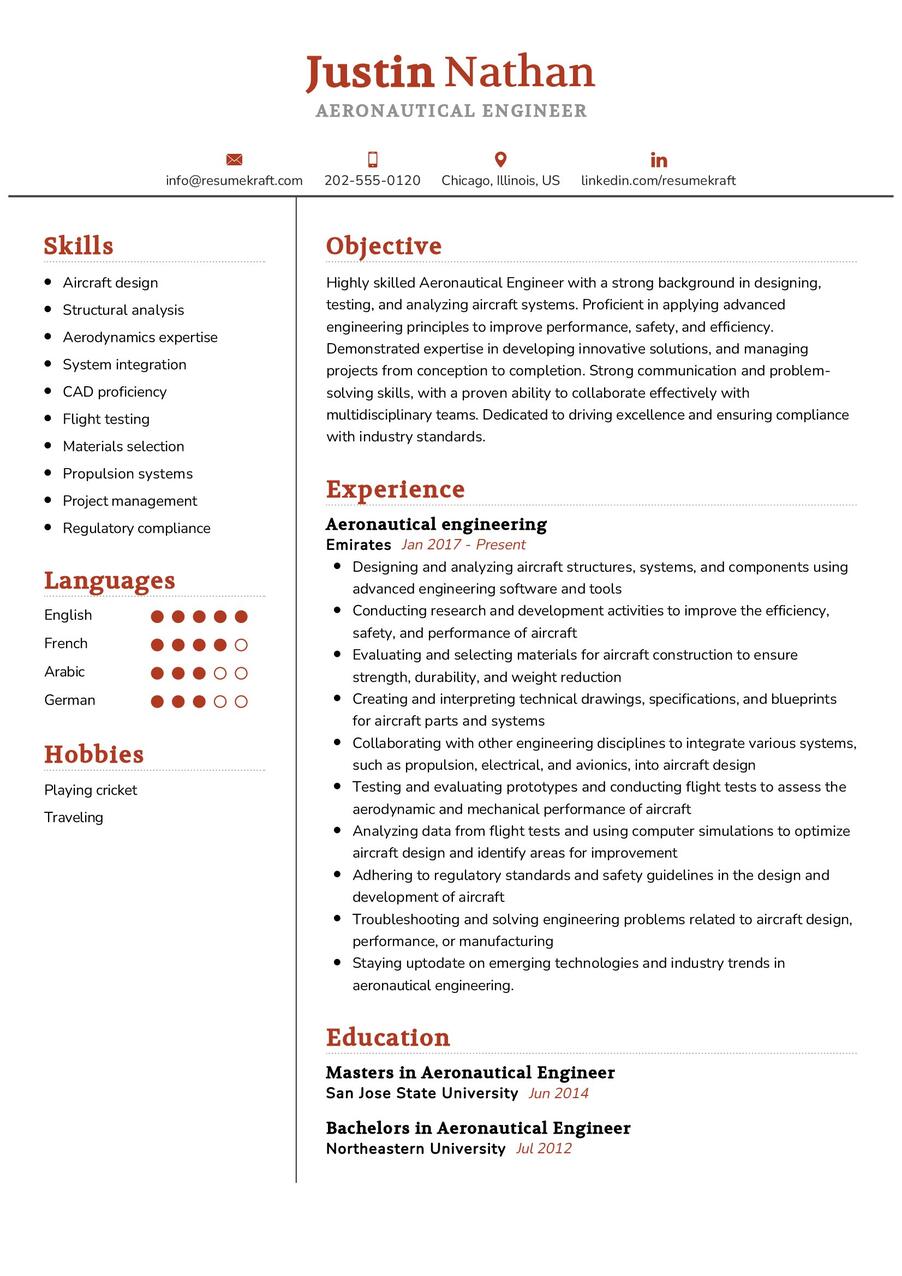Exploring the Role of an Aeronautical Engineer
As the aviation industry soars to new heights, the role of an Aeronautical Engineer has become increasingly vital. A harmonious blend of technical prowess and innovation, an Aeronautical Engineer plays a pivotal role in designing, developing, and maintaining aircraft and spacecraft. Let’s delve deeper into the multifaceted responsibilities and qualifications that define the journey of an Aeronautical Engineer.
Qualifications and Educational Background
Stepping into the shoes of an Aeronautical Engineer demands a solid educational foundation and a passion for aerospace technology. Here are the key qualifications required for this role:
- A Bachelor’s or Master’s degree in Aeronautical Engineering, Mechanical Engineering, or a related field, showcasing a strong foundation in the technical domain.
- Proficient understanding of aerospace principles, aerodynamics, and aircraft systems.
- Hands-on experience with computer-aided design (CAD) software for modeling and simulation.
- Knowledge of industry standards and regulations governing aircraft design and safety.
- Strong analytical and problem-solving skills, essential for addressing complex engineering challenges.
- Effective communication skills to collaborate with cross-functional teams and convey technical information to non-technical stakeholders.
Securing additional certifications in specialized areas such as avionics or propulsion systems can enhance your profile in the competitive aerospace job market.
Responsibilities of an Aeronautical Engineer
The role of an Aeronautical Engineer is dynamic and multifaceted, involving a range of responsibilities that contribute to the development and improvement of aircraft. Here are the core duties that define this role:
- Designing and testing aircraft components, ensuring compliance with safety and performance standards.
- Conducting research to optimize existing aircraft designs or develop new and innovative solutions.
- Collaborating with aeronautical manufacturers to oversee the production and assembly of aircraft components.
- Analyzing and interpreting data from test flights and simulations to identify areas for improvement.
- Participating in the certification process, ensuring that aircraft meet regulatory requirements.
- Staying abreast of advancements in aerospace technology and integrating new innovations into aircraft design.
Each responsibility is a chapter in the exciting story of crafting the future of aviation.
Aeronautical Engineer CV Writing Tips
Your CV is the passport to your dream job in the aerospace industry. Craft a compelling document that highlights your skills, experiences, and passion for aeronautics:
- Emphasize your academic achievements, showcasing your academic excellence and any relevant research projects.
- Detail internships or work experiences, highlighting your contributions to aircraft design or improvement.
- Include specific examples of successful projects, quantifying your impact on enhancing aircraft performance or efficiency.
- List technical skills, such as proficiency in CAD software or knowledge of industry-specific tools and technologies.
- Personalize your CV for each application, aligning your skills with the specific requirements of the job.
Your CV is not just a document; it is a narrative of your journey, skills, and commitment to advancing aerospace technology. Make it stand out!
Aeronautical Engineer CV Summary Examples
Your CV summary is the opening act of your career story, setting the stage for what is to follow. It should be a powerful snapshot of your journey, encapsulating your experiences, skills, and the value you bring to the aerospace industry. Here are some examples to inspire you:
- “Aeronautical Engineer with a Master’s degree in Aeronautical Engineering, skilled in aerodynamics and aircraft design, with a proven track record of optimizing aircraft performance.”
- “Passionate Aeronautical Engineer with hands-on experience in CAD modeling and a keen interest in advancing aviation technology, contributing to successful aircraft design projects.”
- “Experienced Aeronautical Engineer specializing in avionics systems, adept at collaborating with cross-functional teams to ensure the safety and efficiency of aircraft.”
Each summary is a window to your career, offering a glimpse of your journey, your strengths, and your vision as an Aeronautical Engineer.
Create a Strong Experience Section for Your Aeronautical Engineer CV
Your experience section is the heart of your CV, pulsating with the rich experiences you have gathered over the years. It is a space where you narrate your career story, highlighting the milestones and the learning. Here are some examples to guide you:
- “Led a team of engineers in the design and testing of a new aircraft component, resulting in a 15% improvement in fuel efficiency.”
- “Collaborated with manufacturing partners to implement design improvements, reducing production costs by 10% without compromising quality.”
- “Contributed to a research project on advanced propulsion systems, presenting findings at an industry conference and enhancing the company’s reputation in the aerospace community.”
Each experience is a chapter in your career book, narrating tales of challenges met, solutions found, and successes achieved.
Education Section for Your Aeronautical Engineer CV
Your educational journey is the foundation upon which your career stands. It is a testimony to your knowledge, your expertise, and your commitment to learning. Here’s how you can list your educational milestones:
- Master of Science in Aeronautical Engineering, XYZ University, a journey of deep learning and specialization, 2018.
- Bachelor of Science in Mechanical Engineering, ABC University, the foundation stone of your aerospace career, 2014.
- Certification in Avionics Systems Design, Aerospace Institute, a recognition of your expertise in aircraft electronics, 2019.
Each educational qualification is a stepping stone, leading you to the pinnacle of success in your career.
Aeronautical Engineer Skills for Your CV
Your skill set is your toolbox, equipped with a diverse range of tools that you have honed over the years. It is a showcase of your abilities, both innate and acquired. Let’s list down the essential skills that an Aeronautical Engineer should possess:
Soft Skills:
- Problem-solving abilities, the knack of finding solutions to complex engineering challenges.
- Effective communication skills, essential for collaborating with diverse teams and conveying technical information clearly.
- Attention to detail, the meticulous approach to ensuring precision in aircraft design and testing.
- Adaptability and resilience, the ability to navigate evolving project requirements and industry advancements.
- Teamwork and collaboration, fostering a positive and innovative work environment.
Hard Skills:
- Proficiency in computer-aided design (CAD) software for aircraft modeling and simulation.
- Knowledge of aerodynamics principles and aircraft systems.
- Understanding of industry standards and regulations governing aircraft design and safety.
- Experience in avionics systems design or propulsion systems, depending on your specialization.
- Data analysis and interpretation skills, crucial for evaluating test flight results and making design improvements.
Each skill is a tool, aiding you in contributing to the advancement of aerospace technology.
Common Mistakes to Avoid When Writing an Aeronautical Engineer CV
As you craft your CV, it is essential to steer clear of common pitfalls that can hinder your journey to landing your dream job in the aerospace industry. Here we list down the mistakes often seen in CVs and how to avoid them:
- Using a generic template, a strategy that fails to showcase your unique qualifications and experiences.
- Listing job duties without highlighting your specific contributions and achievements, leaving your CV lacking in impact.
- Overlooking the importance of a cover letter, a missed opportunity to express your passion for aeronautics and connect with potential employers.
- Overloading your CV with technical jargon, a strategy that can alienate non-technical readers.
- Failing to proofread, a mistake that can tarnish your professional image.
Each mistake is a pitfall, avoid them to craft a CV that is both authentic and compelling.
Key Takeaways for Your Aeronautical Engineer CV
As we reach the end of this comprehensive guide, let’s recap the key points to keep in mind while crafting your Aeronautical Engineer CV:
- Emphasize your academic achievements and hands-on experiences in aircraft design and improvement.
- Highlight your technical proficiency, showcasing your expertise in relevant tools and technologies.
- Detail the successful projects you have contributed to, quantifying your impact on enhancing aircraft performance or efficiency.
- Include a section on continuous learning, showcasing the certifications and courses undertaken to stay updated with industry advancements.
Finally, feel free to utilize resources like AI CV Builder, CV Design, CV Samples, CV Examples, CV Skills, CV Help, CV Synonyms, and Job Responsibilities to create a standout application and prepare for the [Aeronautical Engineer] job interview.
Armed with these insights and tips, you are now ready to craft a CV that is a true reflection of your journey, your skills, and your aspirations. Remember, your CV is not just a document; it is a canvas where you paint your career story, a story of growth, learning, and innovation. Best of luck!


